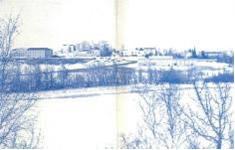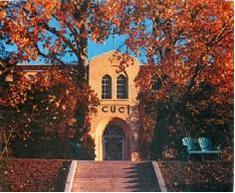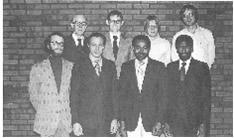Journey - Chapter 9
Back in Canada and Alberta Bound
BY JERRY MCKAY

The return to Canada hit me hard. A lot of energy is spent preparing people for the shock of a new culture, but little is spent on preparing them for the return home. I left Tokyo late one evening, and I was back at my parents’ home the next and in my old bed the next night.
That first morning, I felt like Dorothy in the Wizard of Oz waking from a fantastic dream. Everything was as it had always been, yet everything seemed totally different. Of course, I was the one who had changed. It was unsettling to realize that no one would ever understand what the last year had been like. All the letters I had sent home couldn't capture my experience. How could they? All I could do was to try to pick up where I had left off.
Some things had not changed–those themes. Being back at home, I was once again immersed in the dynamics of my family. I was intentional about my devotional life throughout the summer and my orientation remained right by my side. The only change was a unique summer job that brought with it an excellent illustration of my psychological state of mind.
Although I missed Japan, it was nice to be at home—sort of. I had forgotten what our family dynamics were like. Although living under the same roof, my parents lived separate lives. When dad was downstairs, mom was upstairs. When dad was at home, mom was out. Dad’s drinking—usually on the weekends—affected us deeply. It didn’t matter that I was twenty; I still felt the sadness associated with my parents’ arguments. The mood in the house threw me back emotionally to childhood, and I remembered the fear that I might have been the cause of their marital problems. That feeling is hard to shake.
I was still the “religious” one in the family. Not only did I “have to” go to church every week, I was now the returning missionary. Although I didn’t flaunt the fact, it added to the impression that I walked on water. The only thing I remember doing that irritated my father was playing religious music on weekdays. I think dad was concerned that I was becoming a religious fanatic. In addition to my regular Bible study and prayer, I found other ways to share my faith. That included talking about Japan.
The next best thing to being in Japan was bringing Japan home. With a slide show and a suitcase full of souvenirs, I shared my experiences with anyone who would listen, whether at church or in a welcoming living room. I know I went on and on about Japan. If people were tired of listening to me, no one said so.
I made great effort to stay in touch with friends. Despite the cost—$10.00 for a three-minute call to Tokyo in 1976—I contacted a few of my dearest friends. I also wrote letters.
Decades before Facebook and other social media allowed us to connect with hundreds of people instantly and simultaneously, I wrote letters. Letter writing served two purposes. It lifted me out of my mundane summer, as well as being an extension of my Christian witness. Each letter included some form of encouragement for people to persevere in their journey of faith.
At one point, I corresponded regularly with nearly 100 people. No one was forgotten as I recorded the date I wrote a letter and the date I received a reply. If too much time passed before hearing from someone, I would send off another letter.
I also put my faith into practice in another way. While I hated selling things door to door, I had no problem giving things away. I recruited a church member to go with me one evening a week, or as our schedules allowed, to give out literature.
And there was Wednesday night prayer meeting. As they had been for decades, they were simple and predictable events usually in a church member’s living room. I participated, but they were nothing like the Bible study groups in Tokyo. It was at those meetings that I missed Japan the most. Just when I was feeling the most homesick, however, Donna came for a visit with a Japanese friend of hers. Reminiscing over green tea and rice crackers lifted my spirits.
The most spiritually enriching moments that summer, though, were the few scattered hours spent back on my uncle’s farm. When I walked in the fields or the forest, I felt at peace—the closest to God. Hanging out with the animals did more for my soul than most church services. When I looked into the eyes of one of the animals, and it returned the gaze, I felt connected to something beyond myself. During those few hours, the angst of my orientation melted away.
Because I didn’t interact with many people that summer, my orientation was less of a burden, but it was always present. Occasionally, a tanned shirtless road worker or brawny farm hand working in a nearby field would trigger my angst. The greatest source of distress, however, was closer to home.
My sister, now sixteen going on seventeen, was dating. Although I was protective of her and had her spiritual welfare in mind—concerned that one of her suitors might lure her from the faith—her visitors made me anxious for a different reason.
Like some nosy neighbor, I would watch from behind my bedroom curtain when her male friends arrived. When one of them would take Marilyn for a ride on his motorcycle, it was envy, not concern that consumed me. I wanted to be the one on the back of that bike holding on to the guy for dear life.
Right behind the envy were feelings of condemnation. “What normal guy,” I repeatedly asked myself, “would be jealous of his sister’s boyfriend?” Each time that happened, I felt I was adding a new twist to the 10th commandment. Thou shalt not covet thy sister’s boyfriend!
Many times I was left standing behind the curtain with chest pains brought on by those “why” questions and feelings of abnormality. While this may seem a rather pathetic picture, it is easy to miss what was motivating my behavior. I was lonely and I longed for companionship. When my loneliness emerged, it was a male companion that I wanted. I couldn’t explain why or change that fact. Of course, I told no one.
When I wasn’t involved in church activities, I was working—with bees. That summer, I worked for a church member who managed hundreds of hives for a living.
I was never afraid of bees as a child, and curiosity often got the best of me. Like most boys, given the chance, I poked at a bee’s nest a time or two just to see what would happen. Usually, the bees won. Managing bees as opposed to teasing them is a different story.
To achieve optimal production, we had to constantly monitor the hives. That meant occasionally examining them. Yes, opening them! That’s when the fun began.
Knowing how bees behave works in your favor if you can trust theoretical knowledge. The secret is in knowing that warm sunny days make for busy bees, and busy bees are friendlier bees. That’s when we could dismantle a hive with surprisingly little reaction. Bother them on a cool cloudy day, and we paid the price. The downside is that I had to work on the hot days. While Harry often worked unprotected, I was always cloaked in gloves, a hat, and netting. Even then, the occasional bee worked its way onto my side of the veil! That was too close for comfort.
A fully loaded hive can weigh 200 pounds. Although we would lift the hives together, it didn’t help that Harry was six feet tall and I was 5’ 6” and all of 125 pounds. My lift was always more demanding. It was a “man’s job,” and I survived even though I would have preferred to be at home reading a book or setting an attractive dinner table.
One incident with the bees illustrates my state of mind in general.
One afternoon, I had to walk through a hive—so to speak. We needed to get a piece of equipment from a shed where we extracted the honey. To get the equipment, someone needed to walk through the shed all the way to the back. That would not have been a problem except for the fact that the bees had found the shed. Bees have scouts, and they had discovered where we had taken their honey. They weren’t angry, just out in full force to reclaim what had been stolen. When I opened the door, thousands of bees were inside either crawling on everything or in flight coming and going in every direction.
With my knowledge of bee behavior in mind, I knew “theoretically” that I should be able to walk through all that activity retrieve the object and get back out safely. Bees brushed by me as I walked slowly to the back of the shed. I was focused on my task; they on theirs. It worked. It was an amazing lesson in the suspension of emotion. While suspending emotion helps to control the fight or flight response, it is damaging to one’s emotional health if it becomes a permanent state. I made the connection years later when I started to get in touch with how I suspended my needs and emotions in order to manage the angst around my orientation. When I did participate in social activities, I was usually disconnected emotionally. I could be “one of the group” physically yet detached psychologically. Like in that bee-filled shed, I passed in and out of life with numbed emotions. Understandably, the more I suspended my needs and emotions the greater my loneliness. This is what being “closeted” did to me.
By late August, my quiet bee-filled summer had come to an end, and I was ready to get back to school and friends I had left behind the previous year. I was anxious, though, because there had been a significant change, and that change meant a major relocation. While in Japan, the Church moved the theology program from Kingsway to its college in Alberta.
I drove the 3500 kilometers to Alberta with the beekeeper and his wife in his one-ton truck. It was loaded with beekeeping supplies destined for a bee-keeping relative in Edmonton. The drive was an experience in itself. Even though I had driven the truck, I was not used to using a standard shift on hills like those in northern Ontario.
At one point, we came to a complete stop on a steep hill because of road construction. Try as I might, when I wanted to move on, I couldn’t get out of first gear. Harry bit his lip a number of times as I ground the gears trying to get the truck in forward motion without rolling backward into the cars stopped behind us. To my embarrassment, we had to shut off the truck and switch seats. Although my ego took a hit, the incident didn’t add or subtract anything to my orientation. That was already well-established. On the prairies, the stick shift issue disappeared.
We arrived in Edmonton early on a Friday afternoon. We had enough time to deliver our load of supplies and make it to the college campus for worship as the sun set that Friday evening. One of the first people I met was my roommate Kelvin. He also moved to Alberta to continue his college education. I was pleased to be starting a new year at a new school with my “old” roommate. As well, since it was an Adventist institution, I was at home with the culture and expectations. In addition to Kelvin being there, Donna was there, as well.
 Located just outside of the town of Lacombe, Canadian Union College (now Burman University) sits on a hill overlooking Highway 2—the main route between Calgary and Edmonton. From that vantage point, I had an impressive view of the plains that eventually become the foothills that lead to the Rocky Mountains. It was the furthest north I had ever been.
Located just outside of the town of Lacombe, Canadian Union College (now Burman University) sits on a hill overlooking Highway 2—the main route between Calgary and Edmonton. From that vantage point, I had an impressive view of the plains that eventually become the foothills that lead to the Rocky Mountains. It was the furthest north I had ever been.
During the summer, the sun came close to never setting. By the winter solstice, I would not see the sun if I were indoors between 9 and 4. Many mornings I watched the sun rise during a nine o’clock class. While living on that hilltop, I experienced my first Chinook and spectacular Northern Lights.
Like at Kingsway, I worked on campus. My first job was at the book bindery stamping the titles on the spines of newly bound books. Later, I finagled a cushier job as a monitor in the men’s residence.
 Unlike Kingsway, I was now one among a larger identifiable group—the theology majors. While that may seem like an obvious designation, it was a title that carried a loving but cautionary warning among the student body because we were the nerdy ones on campus—even beating out the science majors.
Unlike Kingsway, I was now one among a larger identifiable group—the theology majors. While that may seem like an obvious designation, it was a title that carried a loving but cautionary warning among the student body because we were the nerdy ones on campus—even beating out the science majors.
We wore not-so-coordinated suit jackets and ties and rushed about with briefcases full of very important theological texts and documents. Because of all the “God stuff” we had to master, we were a bit of a sober group. Although a part of that group, a few of us periodically defied those norms.
Even though my program was only at the bachelor level, the courses were interesting, and I enjoyed my studies. There were crash courses in Old and New Testament (NT) studies. NT studies included a race through the book of Romans. I don’t remember any comments on Romans chapter one; and, of course, I never brought up “those texts” for discussion or clarification. In 1976, the subject of homosexuality was still not on the radar of Adventist educational institutions, which may explain why the text was not explored.
And then there was NT Greek. Languages were never my strength to begin with. I had not done well in French with its masculine and feminine nouns and points of grammatical agreement. If two genders were too much to handle, Greek presented a greater challenge with its third gender—neuter. We were required to take two years of Greek. Although I earned an A the first semester, by the time I finished I could only muster a C. But a C was all I needed. I had a good sense, then, that I would not be pursuing a specialization in Biblical languages.
My program required electives to round out my studies. I bought a trombone and joined the band. I started taking piano lessons to fulfill a childhood dream. And, surprisingly, I signed up for a physical education class. No, not basketball or floor hockey. No potentially shirtless male team sports for me. Fortunately, there were more options now from which to choose. I opted for cross-country skiing. The teacher was a little more rugged than I was, and I think he would have liked me to be more aggressive in my technique. I passed the course nonetheless. Yes, he was attractive in his mustache and sports attire!
 Outside of class, I was involved in recruiting the next group of volunteers to be student missionaries, and for one semester, I was the Theology Club Executive Secretary-Treasurer!
Outside of class, I was involved in recruiting the next group of volunteers to be student missionaries, and for one semester, I was the Theology Club Executive Secretary-Treasurer!
Naturally, my spiritual life was full. Although I was majoring in theology, I never considered those studies an extension of my personal devotions. I regularly sought opportunities to have my thoughtful hour to contemplate Jesus’ life. When I wanted more privacy than my dorm room allowed, I slipped away to a “secret place.”
The men’s dormitory was a very old building. Not long after arriving, I discovered a rickety staircase behind a nondescript door in the recreation room. It led to a storage space that resembled a basement. No one ever went down there except to store furniture or personal belongings most of which had long since been forgotten by its owner. You could barely walk around without stepping on something. What was actually a fire trap became my private sanctuary.
Under one 60-watt light bulb that dangled from the unfinished wood frame ceiling, I set up a small wooden table and chair I had found among the abandoned items. The stacks of boxes dampened any noise making it so quiet I could hear my heart beat. I spent many hours that year cocooned there reading my Bible and praying for family and friends.
Once again, I emphasize my consistent intentional devotional life because it contrasts with the image people often associate with “the homosexual.” So many have been conditioned to believe that homosexuality cannot co-exist with a vibrant faith experience.
Mine does, and my experience is by no means unique.
And again, I must emphasize that I had not yet named my experience or self-identified as anything in any way. I never prayed about my orientation specifically. My feelings and attractions were open to God only in unspoken ways; my heart groaning with those “why” questions.
